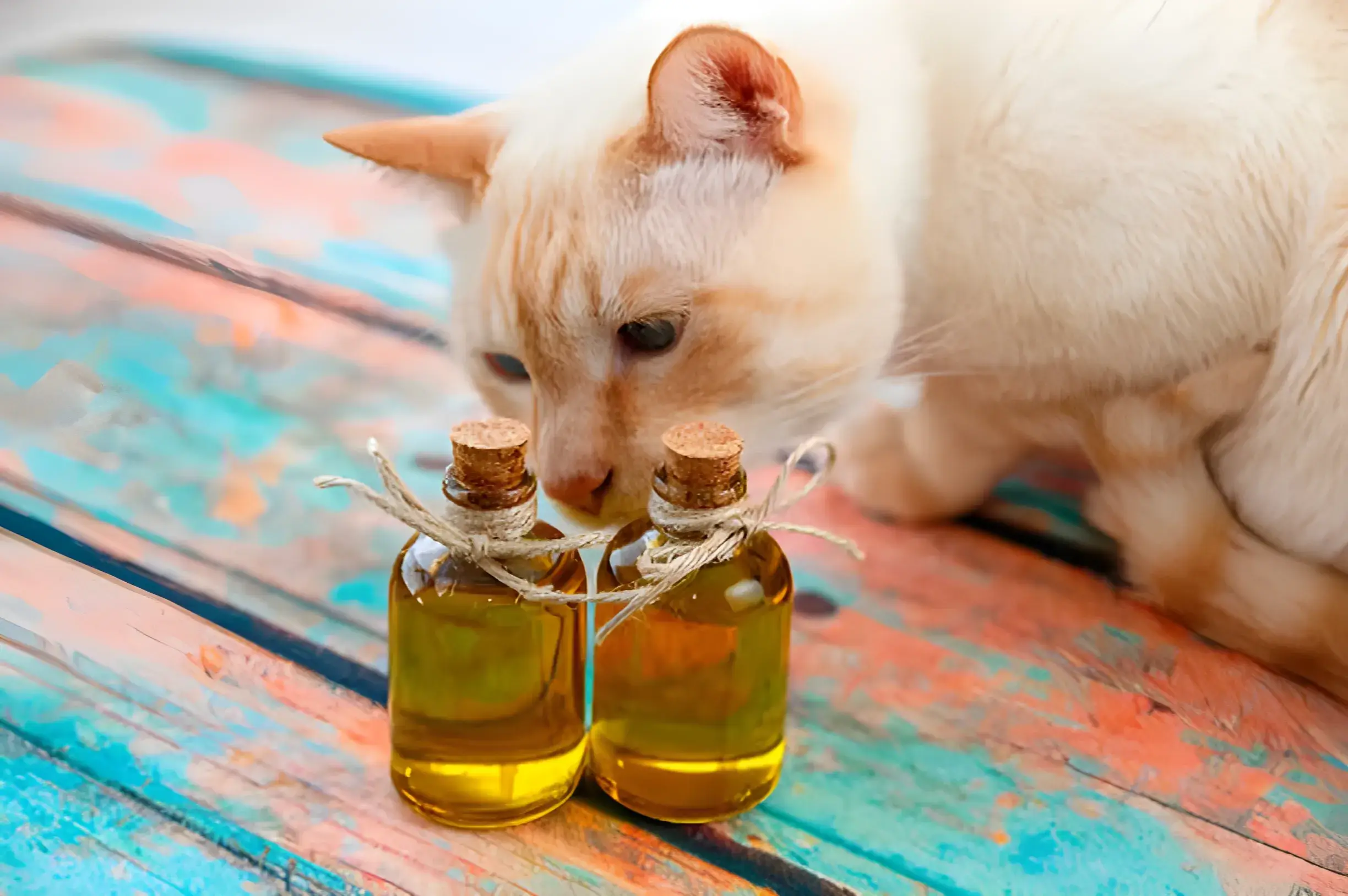Yes, coconut oil can be safe and beneficial for cats in moderation, both topically (on the skin) and in small amounts as part of their diet. However, it’s crucial to choose the right type of coconut oil, start slowly, and be aware of potential downsides.
Benefits of Coconut Oil for Cats
Say Goodbye to Dry Skin: The healthy fats in coconut oil act like a deep conditioner for your cat’s skin, fighting off dryness and making their fur feel incredibly soft.
Easing Hairball Woes: A bit of coconut oil in your cat’s food helps lubricate their digestive tract, helping those pesky hairballs pass more smoothly.
Strengthening Defenses: Coconut oil contains lauric acid, which the body converts into monolaurin – a compound that may offer antibacterial, antiviral, and antifungal support for your cat’s immune system.
Potential Perks: While more research is needed, some studies suggest coconut oil might promote wound healing, ease joint discomfort, and even support healthy brain function in older cats.
How to Use Coconut Oil for Cats
Topical Application: Apply a small amount to your cat’s problem areas like dry skin patches or minor wounds (consult your vet for serious wounds first).
Internal Use: Start with very small amounts (1/8 to 1/4 teaspoon daily) mixed with their food. Gradually increase to a maximum of 1/2 teaspoon per day for an average-sized cat. Monitor your cat for digestive upset.
Finding Acceptance: Some cats love the taste, while others aren’t fans. Try warming the oil slightly or mixing it with yummy treats.
Dosage Chart
It’s crucial to start with small amounts of coconut oil and increase gradually. Here’s a general guideline:
| Cat’s Weight | Starting Dosage | Maximum Dosage |
|---|---|---|
| Under 10 lbs | 1/4 teaspoon | 1/2 teaspoon |
| 10-15 lbs | 1/2 teaspoon | 1 teaspoon |
| Over 15 lbs | 3/4 teaspoon | 1-1.5 teaspoons |
Coconut Oil Safety: Things to Keep in Mind
Start Slow: Cats have sensitive digestive systems. Introduce coconut oil in very small amounts at first, observing for any signs of stomach upset.
Allergies: While uncommon, some cats may be allergic to coconut. Begin with a tiny amount and watch for any reactions like itching, digestive upset, or breathing changes.
High in Fat: Coconut oil is rich in calories, so it’s important to use it sparingly, especially if your cat is prone to weight gain.
Medical Conditions: Talk to your veterinarian before using coconut oil if your cat has any health conditions, like pancreatitis or a history of obesity.
How to Choose the Right Coconut Oil for Your Cat

Here’s what to look for when choosing coconut oil for your feline friend:
Prioritize Purity: Seek out coconut oil with official organic certification. This ensures your cat avoids exposure to any potentially harmful chemicals used in conventional farming.
Keep it Natural (Virgin): This unrefined type preserves the maximum amount of the coconut’s beneficial nutrients, giving your cat the best possible advantage.
Choose Cold-Pressed: This gentle extraction process protects the delicate compounds within the oil, safeguarding their potential health-boosting properties for your cat.
Dispelling Myths about Coconut Oil
Myth: Coconut oil will make my cat fat. While coconut oil is high in calories, the small amounts used for cats are unlikely to cause weight gain.
Myth: Coconut oil is a cure-all. Coconut oil offers potential benefits but shouldn’t replace veterinary care for serious conditions.
Myth: All cats will love coconut oil. Some cats may dislike the taste or texture. Don’t force it if your cat isn’t interested.
Creative Uses for Coconut Oil
Homemade Paw Balm: Combine coconut oil with shea butter and beeswax for a soothing balm for cracked paws.
Ear Cleaning Aid: With your vet’s guidance, a tiny amount of warmed coconut oil can help loosen ear debris in cats.
Treat Time: Freeze small dollops of coconut oil for a refreshing summer snack for your cat.
Conclusion
When used thoughtfully and appropriately, coconut oil can be a fantastic way to support your cat’s overall health and well-being. Remember, a little goes a long way, and always consult your veterinarian if you have any questions or concerns specific to your feline friend.
The photo featured below the post headline is Credit: irinaorel/istockphoto
I hope you find this post helpful and informative. If Yes’ feel free to share it with your friends!
Frequently Asked Question
Can I put coconut oil on my kitten?
It’s best to consult your vet before using coconut oil on kittens, as they have more sensitive systems.
Can coconut oil help with fleas and ticks?
While there’s anecdotal evidence, coconut oil is not a reliable flea and tick preventative. Stick to vet-approved medications.
Can coconut oil help with cat acne?
It may have some benefits due to its antimicrobial properties, but consult your vet for proper diagnosis and treatment of cat acne.
My cat hates the taste of coconut oil. What do I do?
Try mixing it with very tasty food or offer alternative healthy fats like fish oil.
Does coconut oil heal cat wounds?
Coconut oil may help with minor wound healing due to its potential antimicrobial and moisturizing properties. However, always consult your vet for serious wounds.
Can cats have coconut oil for constipation?
Yes, a small amount of coconut oil can act as a gentle lubricant and may help with mild constipation. Monitor your cat for diarrhea and consult your vet if constipation persists.
Can I use coconut oil to relieve my cat’s dry nose?
Yes! Coconut oil’s hydrating properties make it a safe and effective solution for a dry, cracked nose.
Is coconut oil safe for cats with allergies?
While rare, cats can be allergic to coconut. Start with a very small amount and observe for any signs of an allergic reaction.
Can coconut oil help with matted cat fur?
Coconut oil can help detangle minor mats, but severe matting requires professional attention.
How often can I give my cat coconut oil?
This depends on your cat’s tolerance and needs. You can start with once a day or a few times a week.
Can I use coconut oil to give my cat’s fur a healthy shine?
Absolutely! A small amount of coconut oil massaged into their coat will leave it looking sleek and feeling amazingly soft.

